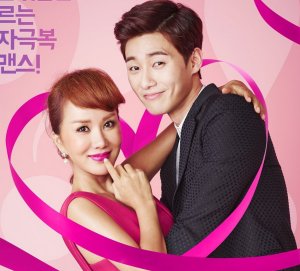
Esta resenha pode conter spoilers
Trying to understand the message
The rumours are true: this show is excellent until it takes a major swerve towards the end. And a lot of people (myself included) didn’t enjoy that swerve (although it was extremely effective as a gut punch). In my case, it’s not because I didn’t like the choice (although I didn’t), but rather that they didn’t explain it well enough. This leaves me trying to decide if this is a writing/direction fumble, or if their message is ultimately intended to be “realistically random”—the problem is, it’s not real life, it is a structured, fictional creation. I know someone chose this, which leaves me asking “why?”.SPOILERS
I’m working this out as I go, so please bear with me.
TL; DR: it’s not their story, it’s HER story.
NHD’s fencing journey is great; I didn’t even mind that they “spoiled” her success and hand-waved her later accomplishments. The show was really only interested in her life until 21/22; everything after that (including the modern framing device) was only there to support that story.
The development of NHD’s relationship with BYJ was also great. It was playful and joyful and painful. And I think this is mostly thanks to her. She’s a poster child for the exuberance of youth. But where did it go?
The show decided to make NHD inadvertently replicate with BYJ the dysfunctional relationship she had with her mother. She ends up with someone distant, who hides/doesn’t share pain, is unreliable and self-centred (in that they are clinging to their career and prioritizing it to an insane degree and/or unable to integrate it with their life or loved ones), and shows love “in the background” with unrevealed actions (that hotel room!).
He is an intense first love and a lousy partner. She needs to get away from him.
NHD is herself the opposite of BYJ: (over)sharing, demonstrative, brave, confrontational, tenacious, reliable. Her “weaknesses” are mostly structural—getting the fencing/coaching opportunities she needs and also the “youth” opportunities that fencing largely precludes; avoiding victimization in unfamiliar settings (as with the documentary and the Internet hate). Rather than self-centred, she is focused. Rather than knuckling under to authority to get along or curry favour, she goes at the problem. Rather than withdrawing, she seeks out. Fencing is a fine metaphor for this—you face your problems and do battle with them.
BYJ tells NHD at one point that one of her best advantages is her mental fortitude (and, when she is younger, the “right to ask for help”). She is resilient. She has enough support when it counts, which allows her to stand on her own two feet when necessary.
He is not mentally strong. He runs away. He retreats into alcoholism. He loses himself in his work by overempathizing. I think he feels inferior.
Because BYJ is ultimately a failure—or perhaps succeeds at the only goal he actually set for himself, which was reuniting his family (but isn’t his dad still a fugitive?). Perhaps he is a victim of “the times” (the IMF crisis and 9/11). He is browbeaten by his father’s creditors until he gives up even the concept of happiness. His home is not so much broken as annihilated.
Yes, he’s handsome. He has the residual breeding of his upbringing and high school glory. But he’s not strong. He even wavers with NHD when he should have been more in control of his emotions.
His only real advantage is being four years older--and as time goes on and NHD matures, this advantage dwindles to essentially nothing.
He loses sight of his relationship with NHD once he’s in it. He detaches and still takes it for granted. NHD cannot escape her mother (or at least it would be more difficult). But she can escape him.
Is this the lesson the show wants to impart?
NHD does the right thing by breaking up/giving up. “You need therapy” was 100% accurate. “I can’t comfort you” was 100% accurate. “You are only with me in the good times; you withdraw in the bad times” (in other words, we aren’t really a couple) was 100% accurate.
He doesn’t appear in the modern framework. He is alluded to. He is present only in “historical” documents (her diary, old video clips). So in the end, this is really NHD’s story. How he developed later (family, whatever) is irrelevant. The show is her reminiscing through the mechanism of her daughter’s “rebellion”.
And I guess that’s okay. But if so, the Kdrama conventions didn’t really work for me. The “couple” structure obscured her story too much.
Still, this drama is well made and well worth a watch.
And NHD burns so bright in youth that we (like BYJ) can still warm our hands and take inspiration from her.
Esta resenha foi útil para você?

Excellent...for 6 episodes
Stop there. You'll enjoy it. PMY kicks all kinds of ass. I rate the first 6 eps 9.5/10.It's appalling how much the show undermines her after that.
The kid is okay at the beginning. Arrogant, but sincere. His transparency is a welcome balm after the tribulations she goes through at the start.
The secondary couple are garbage people. Stop before their "redemption arc" gets going.
The mom is horrible and never gets any better. No loss there.
All you will miss really is a cutesy third couple. You will save yourself so much heartache and disappointment.
Esta resenha foi útil para você?

Esta resenha pode conter spoilers
This was simply awful. Please look elsewhere.
Spoilers (or possibly just warnings) ahead. Trigger warning for sexual assault, if that helps you.TL;DR - "Love" triangle between two selfish guys and one woman with really low self-esteem. A showcase of objectification. Unpleasant. I recommend you go elsewhere for your rom-com/unnatural-cohabitation needs.
This show was like watching your friend go out with a total loser (in this case our friend is Morikawa Aoi, who is clearly a game actress with a lot of talent; she was much better served in Bungaku Shojo, although that is also iffy in spots). It made me feel bad. I watched to the end hoping for…something. I didn't get it.
If you’re hoping the skinship is worth it, it’s not. It’s unsexy and painful to watch. It's cruel, and it's rapey. And the show doesn't seem to confront those aspects of itself. Is this an examination of the FL's state and how she got there? Only accidentally, it seems. It might be interesting as an allegory for how Japanese culture depends on misogyny, but that could be too facile and a bit of a stretch (I'll get into that later, and you can decide for yourself).
Morikawa plays a woman named Terada Aki, who feels directionless. She is in a dead-end part-time job and rather cheerfully states that she has no skills and no dreams--an acceptance of her rotten lot in life that is practically Zen. I mean, she's aware that she has "discounted" herself, but she seems to get by. Presumably she was getting some enjoyment from her boyfriend of four years, but at the start of the show he cheats on her rather matter-of-factly and that's that.
All aboard the low self-esteem express.
She needs a new place to stay. Through her one normal friend (who exits the show after the first few episodes, thus cutting Terada off from any normal advice, I guess) she gets a room in a share house with three other people. This sets up a sort of "love" triangle between her and two selfish, emotionally stunted male leads: Hase, the "rich" guy with a good job whose mother owns the house; and Hongyo, Terada's high school "boyfriend" (and, frankly, rapist), now a successful novelist.
There is another woman in the house, Kuritani, who is weirdly detached and also talks down to Terada and takes advantage of her in her own way, but she doesn't really factor in.
Other, more positive reviews seem to glide over the ugly motivations of the two men or claim they are unexplained or inscrutabe, but they seemed clear to me. Neither one appreciates her for anything other than how she can fulfill their self-centered needs.
Hase grew up with an overbearing mother who was basically all tiger and no mom. His household lacked all warmth (friendly greetings, non-critical attentiveness, genuine concern, and so on). He became successful, but now he is trying to escape his mother (while still living comfortably in the house she owns!). He is sociable but happy to be alone. He is also very cerebral and calculating. Despite or because of his upbringing, he is full of confidence in himself. He is trying his best to dodge marriage (as his mother continues to try to run his life). All he wants is someone ineffectual in the wife role to fend off his mom’s marriage talk without making any demands on him. He doesn’t want sex or companionship.
But he does crave the maternal comfort he never got as a kid. And so he thinks he has found the perfect candidate in Terada, who, despite her luckless state, is unfailing in her politeness, expressive in her care and warmth, an avid cleaner of the house, and (somewhat improbably) a great cook, all while being extremely meek and manipulable. She is a literal (idealized) replacement for his mother. He seems to get the idea from both Terada's natural kindness to him and seeing how easily Hongyo manipulates her (more about that in a sec).
Hase isn't as clever as he thinks, since he likes to muse aloud about his attempts to manipulate both Terada and Hongyo for his own advantage. As the audience, we are also given access to his scheming thoughts (a vantage point we are denied with Hongyo--maybe he doesn't have any thoughts at all). Hase never cares about her feelings. For example, he tricks her into having to pretend to be his girlfriend at a dinner meeting with his mom, after she had decided against doing that. And the few times he gives Terada valid warnings about how Hongyo is mistreating her, it is never out of concern; he is merely trying to “win” her away from his competitor.
Hongyo has the flat affect of a sociopath. The source of his "damage" is never revealed, but he seems to be a budding yet strangely unmotivated sadist. In high school, Terada was attracted to his mysterious loner vibe. She hit on him, and he just went along with it, as blank as ever--until they went to his house. In what appeared to be the spirit of fun (and probably a certain amount of charity from the pretty popular girl to the outsider), she wondered if they should kiss. Maybe she thought he would be flustered and she would maintain "the upper hand". Maybe--stay with me, I know it's wild--she just wanted a kiss. As she indicates to us throughout the show, she had at that point never really encountered any significant setbacks or trauma. She was at the peak of her confidence, and the uber-passive Hongyo wouldn't seem threatening.
But as he explains later, when he suddenly kissed her, the girl who was “always laughing” got a “surprised” look on her face, and he decided he wanted to see more of her making that face. So, he just kept going and took her virginity—something she was not expecting and clearly didn’t want. Her recollection seems to paper over this (she calls him her “first intimate partner”), and, as per usual for her low self-esteem in the present day, she takes responsibility for going along with what happened.
But it’s telling that after that incident she immediately dumps him and never speaks to him again. And that she later identifies that this was the beginning of her crisis of faith in herself, and the end of her confidence.
Back in the present, Hongyo has erectile dysfunction (which is linked to writer's block). Perhaps he does not enjoy sex with women who want to sleep with him. It is easy to imagine that his success as a novelist brought such woman into his orbit who might push through his passivity. But we don’t know why and it is never explained. However, while giving Terada a tour of the house, he “accidentally” pins her face-first against the cupboards—and gets his first erection in two years. Coincidence? Unlikely.
This starts the ridiculous “sleep with me so I can get 'morning wood' and retrain my penis to work” scheme, which Terada perplexingly goes along with. Perhaps her innate pseudo-maternal generosity (which has survived her travails) kicks in. Perhaps she accepts it as her role (everyone in the house seems to pretend that this arrangement is important as a cure for Hongyo’s writer’s block). Perhaps it’s a kind of Stockholm Syndrome that causes her to reframe her rapist as an enigmatic lover--something his behavior doesn’t support, which she recognizes that from time to time.
He is focused on himself. He is not interested in Terada other than for what she can do for him.
Of course, although Hongyo tells her that she can set the boundaries for their "therapeutic" bed time, he continuously pushes them and takes advantage of her compliant nature (and wishful thinking). He gets into her clothes by promising to not move his hand. Then he asks if he can move it "a little" and immediately gropes her breast. All this happens while she lies still with her back to him--he doesn't even bother to face her.
"Progress" is made. He comes in his pants one night. The next session culminates in essentially another rape, where he whines for sex, tells her to lie still when she instinctively moves away, ignores her discomfort at his penetration (all as she lies with her back to him, as before). She tells herself she welcomes it, but it is affectionless, impersonal, short, and unsafe (resulting in a pregnancy scare). He spends zero seconds on her pleasure. Her facial expressions tell us she is not enjoying it.
When they have sex again, she tentatively hugs him (afterward) and tells herself she is receiving a kind of happiness. He actively offers none.
So, this is our triangle: a disinterested liar who feigns emotions to lock down a new mommy and useful fake wife; a sociopath who displays no positive emotions at all but feels entitled somehow to demand a pushover sex object to service his dysfunction; and poor Terada, mistreated (with her complicity) and manipulated but trying to stay cheerful and optimistic somehow so she can find happiness somewhere in all this. She treats them seriously as love matches, when neither cares about her at all.
This sick contest crescendos when Hase “marks his territory” by getting his cologne on Terada (and then taunts his rival openly about it), and Hogyo, having discovered this by literally sniffing the two of them like a dog, retaliates by suddenly biting Terada on the neck when they are in bed (in the usual submissive spooning position) even though she is once again trying to “help” him. He bites so hard that it leaves a noticeable mark. She is hurt, and Hase can only muse later that Hongyo is also “marking” her, as if it were a good stratagem.
In the end, Stockholm Syndrome is too strong to be defeated by transparently fake wooing. She decides to be “with” Hongyo. Hase gives up with good grace, since he gets most of the mommy functions anyway and never really cared about her. She seems to convince herself that she has value in her “lesser” role as both mommy AND sex object (AND cook for the other woman). She recognizes that she gets nothing but room and board—not love—but it is a place in the world and a purpose, I suppose, so she seems to make a kind of peace with herself. She almost breaks free (she moved out, having recognized that there was no genuine love for her in the house), but I guess she had nowhere to go, because she ends up moving back in almost immediately—I don’t even think it was one night.
The end. Barf. Compare this to Bungaku Shojo, where she ultimately overcomes a romantic “power imbalance” and receives both a more-equal partner and self-actualization. Watch that instead!
The metaphor: the heartless “business” man (who wants a functional mommy-like spouse rather than an emotional connection), the cruel and self-important “creative” man (who simulates emotion in his novels but has none in real life), and the liberated yet ineffective “professional” woman (who feels superior to Terada but can’t feed herself—literally, there are several scenes where she has rice on her face) all wind up exploiting and yet depending on the “traditional,” objectified caregiver to enjoy quality of life in their house. They "appreciate" what she can do for them and praise her for that, but they all demand what they want and none of them help her beyond some platitudes and food and shelter. If the house is “Japan,” I think it almost works as a metaphor for a patriarchal system. But is the show interested in exploring that kind of critique? I don't think so.
Regardless, watch something else. This one is just too sad.
Esta resenha foi útil para você?




